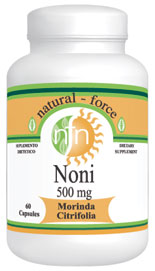
Benefits
- Noni may help alleviate poor digestion.
- Noni may heal gastric ulcers.
- Noni regulates cell function.
- Noni may relieve menstrual cramps.
- Noni may repair damaged cells.
- Noni may help to treat joint disorders.
- Noni may lower blood pressure.
- Noni may help to reverse vascular problems.
- Noni may help to heal sprains, injuries.
- Noni may help to relieve the symptoms of sadness.
- Noni may ease the symptoms associated with age related confusion.
Noni’s wonderful healing properties have been known and used successfully for over 2,000 years. It’s a plant whose fruit is found in warmer climates around the world, with the primary sources coming from Hawaii and Tahiti. The traditional Polynesian healers used the fruit of the noni plant for many things; in fact they used it for everything from a ‘tonic’ to mending broken bones. Different parts of the plant are used to treat those who use it, and scientific studies within the last few decades lend support to the Hawaiian and Polynesians' claims of its unusual healing power. Some of the health-related ingredients found in noni fruit that have been isolated are morindone, morindine, acubin, terpene compounds, L. asperuloside, various anthraquinones, alazarin, caproic acid, caprylic acid, scopoletin, damnacanthal, and other alkaloids. In the early 1990s the marketing of noni juice became very popular not just in the U.S. but in markets world wide, due primarily to word of mouth, and subsequent research…that continues on even today.
A scientist by the name of Dr. Heinicke has spent over 45 years studying phytochemicals such as those found in noni. Dr. Heinicke found that one of the active ingredients wasn’t a carbohydrate or protein found in the plant, it was a chemical called an alkaloid. Alkaloids are by nature some of the most active and important classes of plant chemicals. They are in many cases the components by which certain drugs in the pharmaceutical industry are based. He named an alkaloid he discovered in noni ‘xeronine’ (dry - alkaloid). Xeronine is a relatively small alkaloid which is physiologically very active and important for the proper functioning of all cells in the body. Dr. Heinicke found that Noni contained a precursor form of this alkaloid that he termed ‘pro-xeronine’. When the precursor is ingested the active alkaloid is formed, and releases pure xeronine into the intestines when it comes in contact with certain enzymes.
Other major supporting constituents in noni appear to be polysaccharides and a compound known as damnacanthal. Animal and test tubes studies show noni to have immune-enhancing activity, mostly because of its polysaccharide components that have been shown to increase the release of immune-enhancing compounds that activate white blood cells. An interesting side note is that, damnacanthal is thought to be responsible for producing sedative effects in animal studies.
The research done to date shows that noni and it various components do their work at the cellular level systemically; which can strengthen the immune system, regulate cell function and increase cellular regeneration of damaged cells. The actives in noni help to repair damaged cells by regulating the rigidity and shape of certain proteins. In a sense this may explain the wide range of pathologies that noni may have an affect on. There have been no commonly reported side effects following the ingestion of noni. And since the use of noni during pregnancy, while breast feeding or while taking certain drugs has not been adequately studied it is recommended that it not be used during these times. †
REFERENCES:
- McClatchey W. From Polynesian healers to health food stores: Changing perspectives of Morinda citrifolia (Rubiaceae). Integrative Cancer Therapies 2002; 1(2): 110-120.
- Wang MY, West BJ, Jensen CJ, Nowicki D, Chen S, Palu AK, Anderson G. Morinda citrifolia (Noni): A Literature review and recent advances in noni research. Acta Pharmacol Sin 1002 Dec; 23 (12): 1127-1141.
- Hirazumi A, Furusawa E. An immunomodulatory polysaccharide-rich substance from the fruit juice of Morinda citrifolia (noni) with antitumour activity. Phytother Res 1999;13:380–7.
Packaging: 500 mg., 60 capsules
Back to Top
†These statements have not been evaluated by the FDA. These products are not intended to diagnose, treat, cure or prevent any disease. |